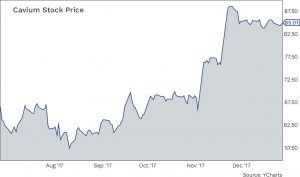Nelson Capital Management


 2017 was an overall good year for the stock market, but there were some clear standouts. International markets outperformed domestic stocks, large-cap stocks generally outperformed small-cap, and we saw a dramatic out performance of growth stocks relative to value stocks across the board. A “growth” company is usually one whose earnings are expected to increase at a faster rate relative to the rest of the market. Growth stocks generally do not pay dividends and trade at higher valuations since investors are willing to pay up for the higher growth. “Value” stocks, on the other hand, are typically more established companies with solid fundamentals, lower valuation and higher dividend yields.
2017 was an overall good year for the stock market, but there were some clear standouts. International markets outperformed domestic stocks, large-cap stocks generally outperformed small-cap, and we saw a dramatic out performance of growth stocks relative to value stocks across the board. A “growth” company is usually one whose earnings are expected to increase at a faster rate relative to the rest of the market. Growth stocks generally do not pay dividends and trade at higher valuations since investors are willing to pay up for the higher growth. “Value” stocks, on the other hand, are typically more established companies with solid fundamentals, lower valuation and higher dividend yields.
The energy sector, which is made up of mostly value stocks, was the worst-performing sector in the S&P 500. Energy was the lone negative performer in 2017. The technology sector, which is dominated by large growth companies, was the best-performing sector in 2017, with a 38.8% return. Within the technology sector, growth stocks such as Salesforce (tkr: CRM) significantly outperformed value stocks like Oracle (tkr: ORCL).
During the fourth quarter, we made two transactions in our global portfolio, tweaking our investment exposure and benefiting from an announced acquisition.
We added to our position in the Vanguard FTSE Developed Markets ETF (tkr: VEA). International markets have lagged domestic markets over the last three years. We believe that the low price-to-earnings ratio, estimated earnings, and dividend yield are attractive. International markets’ relatively low valuation compared favorably with the S&P 500. This purchase followed an increase in our VEA position in June.
 We sold our Cavium (tkr: CAVM) position this quarter after an announcement that it would be acquired. Part of our original thesis on Cavium was that it was an attractive acquisition target. Marvell (tkr: MRVL) announced that it would buy Cavium in a cash and stock deal worth $6 billion. We decided to sell Cavium after the stock price rise that followed the announcement. Marvell develops analog-to-digital interfaces that are applied in data storage and broadband communications. As a larger company with more cash, Marvell’s scale would offer a larger research and development budget for Cavium. However, Cavium would be the combined company’s sole growth engine. Marvell’s largest customers give it significant exposure to the hard disk drive market, which we believe is in secular decline, and we think the combined company would have a weaker thesis than CAVM alone.
We sold our Cavium (tkr: CAVM) position this quarter after an announcement that it would be acquired. Part of our original thesis on Cavium was that it was an attractive acquisition target. Marvell (tkr: MRVL) announced that it would buy Cavium in a cash and stock deal worth $6 billion. We decided to sell Cavium after the stock price rise that followed the announcement. Marvell develops analog-to-digital interfaces that are applied in data storage and broadband communications. As a larger company with more cash, Marvell’s scale would offer a larger research and development budget for Cavium. However, Cavium would be the combined company’s sole growth engine. Marvell’s largest customers give it significant exposure to the hard disk drive market, which we believe is in secular decline, and we think the combined company would have a weaker thesis than CAVM alone.
Individual investment positions detailed in this post should not be construed as a recommendation to purchase or sell the security. Past performance is not necessarily a guide to future performance. There are risks involved in investing, including possible loss of principal. This information is provided for informational purposes only and does not constitute a recommendation for any investment strategy, security or product described herein. Employees and/or owners of Nelson Roberts Investment Advisors, LLC may have a position securities mentioned in this post. Please contact us for a complete list of portfolio holdings. For additional information please contact us at 650-322-4000.
Receive our next post in your inbox.